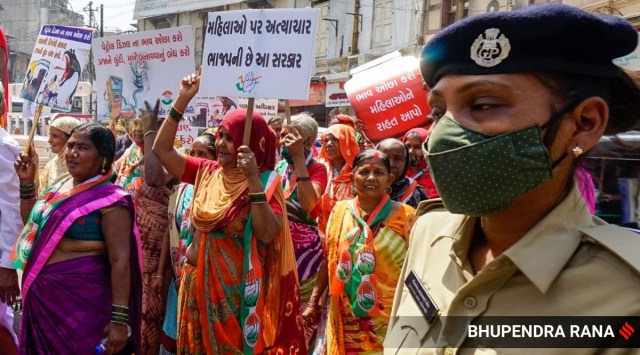From cattle control to river linking, protests force rollbacks in Gujarat
The most recent one was to put in abeyance The Gujarat Cattle Control (Keeping and Moving) in Urban Areas Bill, 2022, a week after it had been passed by the Assembly. It is the first time the state BJP government had to make such a reversal.
 Congress rally in Vadodara against the rising prices of petrol, diesel, LPG and other necessary items. (Express Photo by Bhupendra Rana)
Congress rally in Vadodara against the rising prices of petrol, diesel, LPG and other necessary items. (Express Photo by Bhupendra Rana)At least four major government decisions in poll-bound Gujarat, two of which were taken by the Centre, have been rolled back following protests. The reversal on the decisions was prompted by objections from communities like farmers, cattle herders, tribals and textile associations.
The most recent one was to put in abeyance The Gujarat Cattle Control (Keeping and Moving) in Urban Areas Bill, 2022, a week after it had been passed by the Assembly. It is the first time the state BJP government had to make such a reversal.
 Congress protests in Vadodara against rising inflation. (Express Photo by Bhupendra Rana)
Congress protests in Vadodara against rising inflation. (Express Photo by Bhupendra Rana)
The state Assembly had passed the Bill on March 31, after a six-hour debate. The Congress had put up a stiff opposition to the legislation that has seen vociferous protests by the maldhari community, traditionally cattle rearers.
Among those who opposed the Bill publicly was BJP state chief C R Paatil, who even expressed confidence that it would be “withdrawn” in the next Assembly session. “I think that the (proposed) law might have been framed by some bureaucrat who does not understand the situation in villages,” he told The Indian Express.
However, top government officials said the Bill was moved only after “consultations at multiple levels — at the ministerial level, at the level of the Chief Minister, and at the Cabinet level”.
A senior official said the government had formed a committee headed by the Chief Executive Officer of the Gujarat Urban Development Mission to hold consultations with municipal corporations in the state and study the subject in detail before drafting the Bill.
The official expressed surprise at the government yielding to protests by maldharis, particularly given the detailed consultation process over the Bill. “Cattle in cities are hardly 10-15% of the total cattle population of the state. The rest are in villages, and there is no such issue of cattle menace there. In cities, the law is very clear, you can keep cattle if you have space at home. But right now most maldharis leave their cattle on roads or in public places,” the official said, explaining the need for a legislation to ensure cattle in cities were managed better.
#Watch | Members of Vadodara Congress protest against rising prices of petrol, diesel, LPG and other essential items pic.twitter.com/Tm2h5sE5X0
— Express Gujarat (@ExpressGujarat) April 16, 2022
Before that, on March 29, the Bhupendra Patel government reversed a decision to ensure power supply for the agriculture sector for eight hours daily, from six hours. In turn, it imposed a mandatory weekly holiday for the industry sector.
The decision was taken after farmers held widespread protests over erratic power supply in the first week of March. While the state government supplies power at less than 60 paise per unit to farmers, the industry is charged approximately Rs 8 per unit. As the protests spread to most parts of the state, the government on March 29 announced eight-hour power supply for farmers.
 Bhartiya Kisan Sangh protest in Vadodara last year. (Express Photo)
Bhartiya Kisan Sangh protest in Vadodara last year. (Express Photo)
The next day, citing a 500 MW shortage in supply, the government announced a mandatory weekly off for industries, staggered across different districts. This in turn led to protests by industries. The Gujarat Chamber of Commerce and Industry, saying the industry was not consulted, demanded postponement of the order for a fortnight, to provide the industry to make alternative measures.
Director (Technical) H P Kothari of Gujarat Urja Vij Nigam Limited (GUVNL), the state discom, told The Indian Express: “Due to summer, the power demand has shot up suddenly. There is also demand for electricity from agricultural users because of the harvesting season.”
Eye on polls
WITH Assembly polls due later this year, the BJP is treading cautiously. The rollback of decisions is a clear signal to important voter segments like tribals, farmers, traders and maldharis. While it won a majority in 2017, the BJP saw a drop in its seats.
Gujarat currently has over 37,000 MW of installed electricity production capacity, including 15,400 MW generated through renewable energy, which officials said has huge fluctuations. The peak demand in Gujarat oscillates between 18,000-19,000 MW in summer. Renewable energy supply has huge variations. a number of gas-fired power plants in Gujarat are non-functional due to high cost of gas and power plants operating on coal is functioning at low plant load factor or PLF due to shortage of coal. So currently, Gujarat is buying electricity from the power exchanges at higher costs as the peak demand in Gujarat has shot up to 20,000 MW already this time due to early summer.
The state has been struggling with coal shortage and inadequate electricity generation since October 2021.
Gujarat Energy Minister Kanu Desai said they had held meetings with Union Energy Minister R K Singh, Railway Minister Ashwini Vaishnaw and Coal Minister Prahlad Joshi, to ensure “adequate coal supply, availability of rakes for transport and to ensure that the those who have entered into PPAs (power purchase agreement) with us continue to deliver”.
Desai said the decisions on power supply are taken by the Energy Department under him. “It is for our department to manage the power demand and we cannot approach the Chief Minister every time there is a crisis,” he told The Indian Express.
The third decision rolled back by the government was regarding the Pari-Tapi-Narmada (PTN) linking project. Finance Minister Nirmala Sitharaman had said in her Budget speech on February 1 that detailed project reports (DPRs) for five river-linking projects, including PTN, were ready, indicating a push from the Centre for execution.
On March 28, following a series of protests by tribals, largely led by Congress MLA from Vansda Anant Patel, a delegation led incidentally by Gujarat BJP president Paatil met Sitharaman and Union Jal Shakti Minister Gajendra Shekhawat to seek suspension of the PTN project.
 Tribals protest against Tapi-Par-Narmada river-linking project in Vaghai taluka in Gujarat on Friday. (Express Photo)
Tribals protest against Tapi-Par-Narmada river-linking project in Vaghai taluka in Gujarat on Friday. (Express Photo)
Paatil at the time told The Indian Express that the project “did not have the consent of the Maharashtra and Gujarat governments” and was therefore being suspended. However, records in the Ministry of Jal Shakti show that the DPR for it was readied in 2015 and was modified in continuous consultation with Gujarat officials and the Chief Minister.
Newsletter | Click to get the day’s best explainers in your inbox
A report by the National Water Development Agency under the ministry says: “Chief Engineers-level Meeting was held at Gandhinagar on 9th February, 2017, for firming up of modifications and to revise the DPR of Par-Tapi-Narmada Link Project.” It also records a meeting with the “Chief Minister, Gujarat State, on 31.12.2016”, where it was decided to explore the techno-economic feasibility of providing a pipeline system instead of open canal for main canal of the link. Vijay Rupani was the CM at the time.
An Executive Summary on the ministry’s website on the project also cites a letter, dated January 18, 2017, by the Secretary, Government of Gujarat, to the National Water Development Agency to explore the possibility suggested by the CM while revising the DPR.
BJP MLA from Dang Vijay Patel who had demanded that the PTN project be scrapped told this paper, “It is an old project that was conceived during Congress rule. We had objected to the project in 2010 as well. It is clear that the project will be implemented only if there is consent of both Gujarat and Maharashtra states.”
State Tribal Development Minister Naresh Patel said there was “no question of implementation of the project”. Be it the BJP or Congress at the Centre, the “BJP government (in Gujarat) has made representations while keeping tribals together and not allowed it (the project) to move forward”, said Naresh.
But on March 29, Water Resources Minister Rushikesh Patel told the Gujarat Assembly that “political turn of events” led to the project being suspended. “As tribals were not in favour of implementing the project, we requested the Centre to suspend the project,” he said.
Paatil says the project was started during the time of Prime Minister Manmohan Singh. “They got a survey done. He (Singh) signed the Memorandum of Understanding (MoU), completed entire process. But when it was announced, tribals opposed it and that it is causing them harm. And therefore, we made representation to the PM and also met Amitbhai (Shah)…We will get it (the project) cancelled after (necessary) process.”
The project proposes to supply water from the water-surplus regions of Western Ghats to the scarce regions of Saurashtra-Kutch by linking the three rivers of Par (which originates in Nashik, Maharashtra), Tapi in South Gujarat and Narmada.
An official from the Water Supply Department told The Indian Express that the link project has continued to remain on paper despite the DPR. “No officials or technical experts were appointed to execute the project. The project remained restricted on paper till the government decided to suspend it,” the official said.
One other decision taken by the Centre which was put on hold following pushback from Gujarat was the hike in GST from 5 per cent to 12 per cent on textile goods. To be implemented from January 1, it was suspended in December last year following representations from the Federation of Surat Textile Traders’ Association through the South Gujarat Chamber of Commerce and Industry.
The Surat chamber argued that the textile industry in Surat, that employs around 15 lakh people from Bihar, Odisha, Uttar Pradesh and Rajasthan, and runs around seven lakh powerlooms, would be hit. The daily business turnover of the Surat textile trading industry is between Rs 150-200 crore.
Asked if there was a communication lag between the state government and party, leading to a rethink on decisions, Paatil said: “There is no such gap. We work in coordination with each other on all subjects. There is no issue on which we had to step back.”







